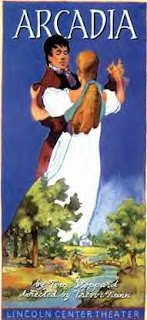The first session I attended was on Byron's legacy. Sadly, none of the panelists talked much about Byron's dramas, but Ghislaine Gaye McDayter gave an interesting talk on his poem "The Waltz" and Matt Sandler discussed the influence of "She Walks in Beauty" on the poem "Harlem Shadows" by Claude McKay.
Later in the afternoon, I went to a session on Eugene O'Neill, so there was much more discussion of drama. Bess Rowen spoke, comparing the stage directions in O'Neill's The Emperor Jones with those in Marita Bonner's The Purple Flower. Next, Nicole Tabor made some interesting comments on the representation of Standard Oil in A Moon for the Misbegotten. Reagan Venturi gave a comparison between O'Neill's Long Day's Journey Into Night and the Tracy Letts play August: Osage County. The last speaker, Donald Gagnon, compared O'Neill with August Wilson.
Friday morning, I delivered my paper, beginning with an overview of Byron's reception during the Victorian era, and then looking at his impact on 20th- and 21st-century dramatists. O'Neill, of course, was one of the playwrights to be strongly impacted by Byron, and his play A Touch of the Poet quotes Byron numerous times. Romulus Linney put Byron on stage as the opium-induced hallucination of his daughter in Childe Byron, and Howard Brenton portrayed him with other Romantics in Bloody Poetry. Byron appears as an off-stage character in Tom Stoppard's play Arcadia, and more recently, he provided the namesake of Johnny "Rooster" Byron in Jez Butterworth's Jerusalem.
After my session, I was able to catch a panel on "Disabling Environments of the Romantic Era." Unfortunately, there wasn't much talk about Romantic drama, but Diana Little made some nice observations on the sonnets of Charlotte Smith, and Jane Kim linked the Korean poet Yun Dong-Ju with Mary Shelley's novel Frankenstein. Next, I went to a session on Victorian gaslighting inspired by Patrick Hamilton's play Gaslight. After that, I attended an interesting panel on Pan-European Romanticism, which included Jonathan Gross talking about Alexander Pushkin, Martin Prochazka discussing the Czech poet K.H. Macha, Andra Bailard comparing Byron and George Sand, and and Omar Miranda speaking on Madame de Staël.
While Dickens and Lawrence both wrote plays, there wasn't much talk about their dramas at the convention. Still, I very much enjoyed a panel on Lawrence and Affect sponsored by the D.H. Lawrence Society of North America. That organization co-sponsored with the Dickens Society the panel I presided at on Saturday morning. Bridget Chalk and Tara Moore both gave excellent papers. Unfortunately, Holly Laird was ill and wasn't able to come, but I read her abstract for her, along with Lawrence's poem "Dreams Old" which mentions characters from David Copperfield.
It's been a while since I last attended the MLA convention, but I enjoyed seeing people I knew as well as meeting new folks.
